#Mirrodin Block
Explore tagged Tumblr posts
Text
A history of red precons: Theme Decks
I'm slowly going through all the monored precons, because why not? Today: Theme Decks! In particular Goblin Mob from Scourge, Master Blaster from Darksteel and Spiritbane from Champions of Kamigawa. Well, those are the three monored decks WoTC released!
A series where I take a look at how Magic has changed by looking at Preconstructed decks which share a theme, strategy or colour combination. In part one of “Red” I covered Starter decks, and part two World Championship decks. This is part three! So I’m going to get Flames of Rath out of the way first, and try not to bring it up again and again. It’s a pretty cool deck, lots of mountains and…
#60 Card Casual#card-games#Darksteel#Goblin Mob#History#Kamigawa#Kamigawa Block#Kitchen Table Magic#magic#Magic: the Gathering#Master Blaster#Mirrodin#Mirrodin Block#Monored#MTG#Nostalgia#Old Frame#Onlsaught Block#Onslaught#Precon#Preconstructed Deck#Red#Scourge#Spiritbane#Theme Deck
0 notes
Note
Perhaps it's nostalgia, but looking back at incredible blocks whose story we were able to follow in real time with their releases, such as the Scars of Mirrodin block and their battle against the New Phyrexians, I can't help but feel as though the 3-set Block structure lended more to immersion in the story. Do you think there's potential for (with enough player feedback) WOTC to consider making the change back?
This is a common topic here on Blogatog. We spent over two decades trying to make blocks work. We did a lot of experimentation, tried a lot of things, and none of it was able to change the core problem of the second set always selling worst than the first and the third worse than the second.
The move to the current system where we move around worlds set to set was the first thing we did that actually addressed the problem. So, I am very skeptical we're returning to blocks. The current system has proven so much more effective. That doesn't mean we can't stay on a world for consecutive sets if there is a strong reason, but the bar is high.
77 notes
·
View notes
Note
#creative block is also cool #finally a power crept Override
Oh I've never heard of that card, let me see-


You're more amazing than a 1/1000 chance
Blue commons, and another rare I had an idea for




















Blue and black together cover all 4 modification themes in the set, so a card that rewards you for using all the different themes is obvious! Unfortunately, treating +1/+1 counters and keyword counters as different kinds of modifications would be confusing, difficult to word, and wouldn't even match the usual reminder text for modified, so you don't technically need to use all 4 themes. But still, this is some great untapped design space, perfect for rare!
#holy fucking shit they printed some bad commons back in the day#THREE MANA?!?!?#for THAT!?#for a second i was worried i'd made Creative Block too strong#no. no this is just absolutely terrible#i'm so glad the era of unplayable commons is over#seeing these two trash cards from mirrodin block makes me wonder if there's a whole cycle of these#3-drop instants that are absolute trash if you don't control like 5+ artifacts#though now that i'm thinking about it again Creative Block might be just a little too strong#it's a solid counterspell even with no artifacts/enchantments and in a dedicated deck it's basically a true counterspell#oh wait never mind i just rediscovered Spell Stutter lol#i remember now that's what i based it off of in the first place#but “artifact deck” is a lot more broad and common than “faerie deck” so idk...#and 2-mana “counter unless pay 2” spells like Make Disappear are just really good even without upside#Spell Stutter might be a bit too powerful too#i might change Creative Block to “counter unless pay 1 plus blah blah blah”
2 notes
·
View notes
Text
Sword of Body and Mind (D&D 5e)

Weapon (any sword), very rare (optional attunement)
You gain a +2 bonus to attack and damage rolls made with this magic weapon. While attuned, you have resistance to force and psychic damage.
While this weapon is unsheathed, it sheds bright light in a 10-foot radius and dim light for another 10 feet.
Whenever you hit with this weapon, choose one of its two modes. It deals 1d6 extra damage of that mode’s type (indicated in brackets). If you are attuned and you have not already activated an effect of the sword this turn, you can also activate the chosen mode’s effect:
Body (Force). The target must make a DC 15 Constitution saving throw. On a failure, the next attack roll that you or your allies make against it before the end of your next turn has advantage.
Mind (Psychic). The target must make a DC 15 Intelligence saving throw. On a failure, it subtracts 1d4 from the next saving throw it makes before your next turn.
(Art by Chris Rahn)
--
Check out the full cycle in the preview of Glistener's Guide to New Phyrexia, coming very soon! In addition to iconic Mirrodin magic items, it will include new species, monster/NPC stat blocks, new spells, a rule set for phyresis and compleation, and more!
#now with revamped and hopefully more intelligible wording!#the wolf is metaphorical#mtg#magic the gathering#dnd#dnd 5e#dnd homebrew#glistener's guide to new phyrexia#new phyrexia#mirrodin
53 notes
·
View notes
Text
Just something that I came across in edh- there are a pair of cards from the Scars of Mirrodin block that make fantastic Sol Ring proxies:

Panic Spellbomb is the better of the two, as it has the free tap symbol, but origin has some good Sol Ring art. I spent a couple of seconds blotting everything out with a metallic acryllic paint, dabbed the art into a more rusty ring, and then took a marker to it and voila, an easy proxy.
45 notes
·
View notes
Text
I have one EDH deck and it's Anax & Cymede.
Boros EDH combat deck time: My Brain Small, My Meat Huge, My Pain Endless, I human soldier ever onward
So there are more tumblr mtg players than I anticipated, it turns out. What's everyone's favourite commander?
I'll go first, Juri of the Revue.
(Honourable mention to my meme deck where you have to get a date for Jenson Carthalion, Druid Exile by swiping left or right with his scry ability.)
#MtG#to be fair I haven't played in years#but the deck began as a mono-white Innistrad deck#the first deck I ever really felt a connection with back in college#I played during Rise of the Eldrazi and the second Mirrodin block but it was Innistrad that won my heart for real#then I've got Tarkir and I've got Theros and then I mostly fell off again#couple cards from various ravnica blocks just because they're good#The deck wrecks face 1v1#of course Commander is a multiplayer format so...
739 notes
·
View notes
Text
I think I've finally put my finger on why I'm less bothered by recent and upcoming Magic sets.
I got into Magic in 2001. My first Magic cards were a 7th Edition Starter Kit. More importantly to my point, my formative Magic experience consisted of Onslaught block and the original visits to Mirrodin, Kamigawa, and Ravnica.
So for me, whenever I think about what the "core" of Magic is to me, I mostly come back to two major elements: the Multiverse setting allowing countless different worlds with wildly different themes to be explored, and the idea that there's more to fantasy than just "generic vaguely medieval European fantasy setting."
Maybe that's why Universes Beyond doesn't bother me. Maybe that's why sets like Thunder Junction and Duskmourn and Aetherdrift don't bother me. Heck, even the cyberpunk elements of Kamigawa: Neon Dynasty are starting to grow on me despite my initial dislike of them.
Because to me this is what Magic the Gathering is all about. That exploration of countless different worlds and settings, this radical take on what the fantasy genre can be.
16 notes
·
View notes
Text
I never expected to like the approach WotC would take with Dragonstorm, since they're obviously trying to have their cake and eat it too w.r.t. khans and dragons. But it was even more disappointing to find out that the dragonlords were wiped out off-screen years before the events of the set. This and Aetherdrift both seem to have the same issue, which is that all the meaningful story beats are being hand-waved away as backstory in order to make the set as "marketable" as possible, rather than attempting to be narratively interesting. It's the same problem Scars of Mirrodin block almost had when it positioned New Phyrexia as the first set, but Maro was smart enough back then to realize they had to show Mirrodin falling for anyone to care
7 notes
·
View notes
Text
Nissa's Pilgrimage Part I: Worldwaker
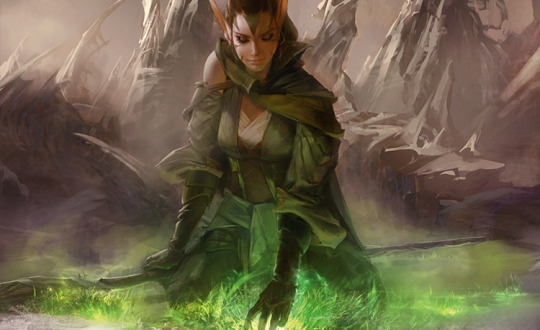
Preface:
Hi there! My name is Steven; I recently wrapped up a master’s degree in library science and am doing my best to segue careers. Since my terminally long job hunt has left me with more down time than I ever wanted to have, I decided to put my English degree to good(?🤷) use by writing a bunch of personal essays on Magic the Gathering, as it is a topic I have been obsessed with for around a decade now. I didn’t intend to share these ramblings at first, and I began this whole project for my own edification, to keep my brain active, and to prevent myself going insane from boredom. However, I thought it couldn’t hurt to throw these online and see what comes of it.
This particular piece is part 1 of ???. I have a lot of notes in my drafts and even more thoughts in my head, so it may just go on indefinitely until someone (finally) gives me a dang job.
TLDR: I’m a deranged MTG Vorthos and former English major with a lot of thoughts and even more time on my hands, so I began a handful of English major-y essays on my pet topics. I’m posting them here for now.
Introduction:
Almost every Magic player who began learning the game after the planeswalker card type was introduced in the Lorwyn expansion in October, 2007 can tell you a story about the first planeswalker card they fell in love with. It might have been because the mechanics on the card melded perfectly with their preferred strategy of play, it might have been because they kept up with the story and were invested in the represented character’s journey, or it might have simply been because they thought the art looked cool.
For whatever reason under Mirrodin’s five suns a Magic player first became attached to a planeswalker and their cards, the character often become symbolic for our love of the game itself. These symbols grow beyond simple loyalty abilities on a piece of cardboard and become inexorably intertwined with our own personal Magic experience.
For me, this planeswalker was Nissa Revane.
You see, in March of 2014, I started working at The Game Closet in Waco, Texas. I had just finished getting a master’s degree in English, so of course, my first job out in the real world was to become a clerk at my local game store (really putting my humanities education to work). Having grown up in a small Louisiana town, I never had a chance to play Magic. I entered the tabletop gaming world through my obsession with Dungeons & Dragons, Shadowrun, and sundry other RPG’s.
Nevertheless, as Magic players made up the majority of the store’s customer base, I took it upon myself to learn the game. The Theros block was wrapping up at the time with its third set, Journey into Nyx, and a bunch of friendly players were more than happy to unload all of their bulk commons and uncommons to me (Journey into Nyx was famously underpowered, after all), so I tried to make a standard deck out of all this draft chaff and run it at Friday Night Magic.
It didn’t go too well.
However, I was happy with the overall direction of the deck, and I immediately discovered that I loved green decks, specifically green ramp strategies.
I was enthralled with the idea of accelerating mana so that you can play flashy, intimidating creatures and cool, game warping spells far earlier than you have any right to, so I continued to tweak the deck until I made a functioning version of the Theros Standard Mono Green Devotion deck. Even though I wasn’t good enough at the game in my early days to consistently win (even at the local level), I had a lot of fun with it! It was fast and explosive, but for some reason, I couldn’t shake the feeling that it was missing something.
However, not a few months later, the Magic 2015 Core Set gets released, and the chase mythic rare in the set’s early days was exactly the kind of card I was looking for: Nissa, Worldwaker. I had no idea who this Nissa character was supposed to be — though I did think the art looked pretty cool — but I was in awe of the card’s abilities! It was precisely the kind of fuel I felt my standard deck needed at the time, and it turns out I was right! My Magic the Gathering “competitive” “career” begins and ends with a handful of first place rankings at my local game store’s standard FNM events, but as small a victory as those are, nearly all of these top rankings were due to Nissa, Worldwaker.
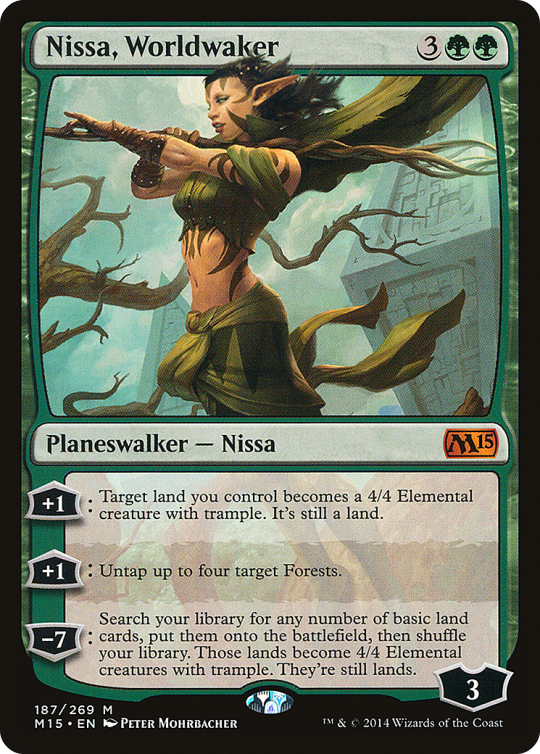
Needless to say, I became devoted to the character overnight.
Exploration:
But who is Nissa, really? Let’s start with the basics. Nissa is an elf planeswalker from the plane of Zendikar, a largely untamed wilderness where the land itself has a will of its own, causing unforeseeable (un)natural disasters called “the roil” by Zendikari locals. According to the recently-released Magic The Gathering: The Visual Guide by Jay Annelli, Nissa is in her 60s and she is 5 feet, 2 inches tall, making her the smallest of the original four members of the Gatewatch (five if you count Liliana). Nissa has a mystical connection to the land and can sense a plane’s leylines, giving her a measure of control over the ground she walks on; this allows her to animate the very land itself to fight her enemies, a narrative element that has been expressed mechanically time and time again on Nissa’s cards throughout the years.
Ostracized from the elven clan she was born in, the Joraga, for the crime of having this connection to the land (a rare brand of sorcery called “animism” in the lore of Magic), Nissa spent large stretches of years alone with only the spirits of the natural world as companions. This has made her socially awkward to a fault, and the issues she has in communicating with her friends (and later, lovers) has been a fairly consistent plot point throughout all of the (canon) story arcs she has played a part in.
In a fictional universe that contains ageless elder dragons, a man-eating toad, a sentient robot who literally created a planet from scratch, and a wizard who once phased an entire continent out of the time stream, Nissa Revane’s eternal struggle to express simple feelings to people she shares a bond with always seemed to me the most human element in the Magic canon. Additionally (big surprise), that’s something I have in common with her. While other Vorthoses have made the argument that Nissa is on the autism spectrum, that is something I have neither the personal experience with nor the education of to speak about. That is certainly a valid lens to view this character through, however, so if that interests you, I’d encourage you to search up these pieces on your own.
What I can speak on with a certain level of expertise, however, is the personal struggle of being a shy, withdrawn introvert in an extroverted world. As a lifelong wallflower with a vivid imagination and a rich inner world, I can deeply relate to a character who doesn’t know how to put her intense feelings to words. For example, in the final story of the Kaladesh arc, Renewal, Nissa tries to express to her companion Chandra just how deeply she wants to be “friends” with her:
Nissa swallowed past the desert in her throat. "I don't speak often. I lived alone for...decades. Zendikar was my companion. We understood each other at a level deeper than words. I...I don't know how to talk to you. I'm trying to learn." Chandra looked up, eyes wide and startled. "You don't know how to talk to me?" "I will make mistakes," Nissa said. "Pick the wrong words. Misunderstand yours. I'll act strange and won't know that I am. But if you can be patient with me, I would like to be..." Waves of sky-song memory welled upward, symphonies of color and warmth, resonant movement and shared breath. She stilled them, reduced them, and forced out angular words shaped in a pallid shadow of acceptable truth. "...your friend." Chandra's hands leapt out to enfold hers, warm as a bird's nest. "I dunno," she sniffled, one corner of her mouth quivering upward. "I think you're pretty good at picking words." "It took all afternoon to decide how to say this."
While this section of Renewal is a cornerstone of Nissa’s and Chandra’s future romantic relationship, that is a topic big enough to warrant its own essay in order to do it justice. For now, though, let’s focus on this bit: “‘I would like to be…’ Waves of sky-song memory welled upward, symphonies of color and warmth, resonant movement and shared breath. She stilled them, reduced them, and forced out angular words shaped in a pallid shadow of acceptable truth. ‘...your friend.’” Nissa’s never ending struggle to use words grand enough to communicate the intensity of the feelings in her heart has stuck with me since Renewal was posted on Magic’s website in 2017. I doubt I’m the only one, either.
Heroic Intervention
Nissa was already the character I was most invested in back in 2017, but observing her deep well of emotions she didn’t know to express and her entire lifetime's worth of interests and experiences she didn’t know how to talk about helped me, I think, come to terms the previous two-and-a-half decades of my own life that I spent cowering in corners at parties, being as unobtrusive as possible in the lives of my friends and family, and holding myself back because I didn’t think anyone would ever want me around - as a friend, as a lover, or even as a coworker. This section, from later on in Renewal, really gutted me at the time:
What would she do, if she had the time again? If she didn't flinch at light, noise, and touch, or speak in gestures and movements strange and off-putting to others? How could she tell this new life to laugh and weep without reservation or regret; to sing to the stars and waters, or to nothing at all; to love unreserved and unguarded; to treasure every moment with those beloved; to forgive any regretted trespass; to dance when moved to; to savor long silences in warm company; to greet each dawn, each face with the thought, this will be an adventure; to be brave, and kind, and trusting, and... ...like Chandra. The aetherborn waited, flickering. But why would anyone find her thoughts on the matter of value, anyway? Don't be afraid to follow your heart, Nissa told them. ...Why would that be scary? Halfway across Ghirapur, her body exhaled a laugh into the deepening twilight. May it ever puzzle you.
It wasn’t too long after this story was published that I began my own journey from hiding in the shadows to living my life in a way I was proud of. I moved away with the woman I was dating at the time, and even though that relationship ended up not working out, I spent five long, fun, life-altering years learning to
laugh and weep without reservation or regret; to sing to the stars and waters, or to nothing at all; to love unreserved and unguarded; to treasure every moment with those beloved; to forgive any regretted trespass; to dance when moved to; to savor long silences in warm company; to greet each dawn, each face with the thought, this will be an adventure.
I wonder to this day if the courage Nissa displayed during her own pilgrimage helped nurture in me the courage I needed in my own…
Conclusion
If you made this far, thanks! I’m not sure who, if any, will be interested in these endless ramblings, but if you're here, I hope you found something in it to enjoy!
Further entries in this little series will cover who Nissa is as a character, how she has been treated by various writers in Magic's various seasons, and why that matters (to me at least). The next longform piece I post will go over Nissa’s dual origins, why she was retconned from an incompetent xenophobe into the cinnamon roll with baggage we know today, and what both the Magic Story Team and its fans have made of this shift over the years.
References
Annelli, J. Magic The Gathering The Visual Guide. DK Publishing
Li, M., Digges, K., Luhrs, A., Beyer D., & L'Etoile, C. (2017). Renewal
59 notes
·
View notes
Text

After Mirrodin became New Phyrexia, "Magic the Gathering" gave players their first taste of Innistrad, the plane filled with Gothic Horror tropes. Innistrad was a plane of vampires and werewolves, the latter using a new card technique to create cards that 'transform' when flipped over. There were also spirits and zombies along with the humans who had to fight to survive all of these things.
And what would the original Innistrad block add to a collection of cards whose number matched the set number they were printed in? Let's take a look.
Set #56 is the original 'Innistrad' set and it's 56th card is Fortress Crab, a 1/6 blue vanilla crab for four mana. A nice big blocker.
Set #57 is 'Dark Ascension' and card #57 for this set is Curse of Thirst". Curses were also a new card type introduced throughout the original Innistrad block. Curses were attached to players with effects that hindered the player they were attached to.
Set #58 was 'Avacyn Restored' with the 58th card of that set being Ghostly Touch, a nice aura which granted a tapping ability to the enchanted creature whenever it attacked.
My favorite card overall from this block was Garruk Relentless/Veil-Cursed. I became a big fan of Garruk at this time, still am, and really want to see more of him.
What did you think of the original Innistrad block and the cards above?
7 notes
·
View notes
Text
Theme Deck Review Compendium: Fifth Dawn “Sunburst”
This is final Theme Deck of Fifth Dawn and is a pretty interesting way to see out the block. Is it any good as a deck though? Let's review the reviews.
So I accidentally posted the Stampede post which was meant to be today early. But I’ll probably just jam in an extra Compendium post on a Friday instead of a deePRECONnaisance one, and that’ll make things nice and tidy again. 🙂 Oh and apparently Internet Archives had been hacked and is completely down? I’m furious. I think I probably browse archived versions of webpages more than I do live ones…
#2004#5th Dawn#60 Card Casual#card-games#Cards#Commander#Compendium#EDH#Fifth Dawn#Kitchen Table Magic#Magic Cards#Magic: the Gathering#Mirrodin Block#MTG#Nostalgia#Precon#Preconstructed Deck#Sunburst#Theme Deck
0 notes
Note
Are artifact lands still a ten on the storm scale? We've had a few in standard sets since your storm scale article for Mirrodin block (which the wiki cites as the last time you made a ruling on them).
I’ll downgrade them to an 8.
63 notes
·
View notes
Note
Actually hang on I just saw this card and it made me so angry that I needed to make a version that isn't completely terrible

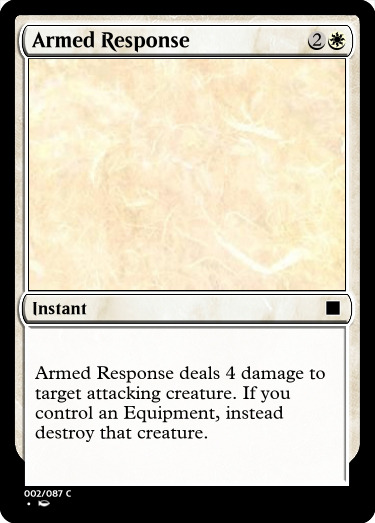
This version is still terrible, to be clear. For context on just how terrible it is, here are two cards that always destroy the creature AND have an extra bonus
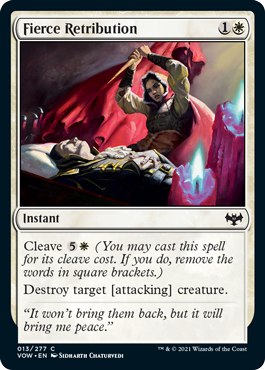
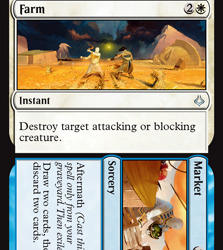
You're more amazing than Branches
Quick card design in text form
Parry
UR
Instant
Gain control of target spell that targets you or a permanent you control. You may choose new targets for it.
#Fierce Retribution even costs less and it's a common!#like god damn how did Armed Response get printed?#were they expecting players to play mono-equipment?#you'd be lucky to deal 3 damage with that#and of course it's completely useless if you don't have equipment#what in the world was going on in Fifth Dawn?#i just checked and there were only 10 equipment in that set and only 6 at common#how were you supposed to make this work in limited?#and limited is the ONLY place you'd be playing this because it is absolutely Not For Constructed#okay i just looked up the set and apparently it was part of the Mirrodin block and the Mirrodin set had an equipment theme#and sets used to be drafted together as a block or something#well the thing is that WOULD make sense but Mirrodin only has 7 equipment at common#oh wait shit i just checked Lost Caverns of Ixalan for dinosaurs and there's only 10 at common#and 3 of them are the off-color landcycling cards#so. um. i think i might not fully understand how many cards of a type are needed for a draft theme#also Fifth Dawn was a small set so 6 cards at common is a bigger portion of the set than LCoI's 10 common dinosaurs#but REGARDLESS this card is STILL BLATANTLY UNPLAYABLE#even if you can put tons of equipment in your deck that doesn't mean you should#just to make to weakest removal spell ever be able to kill a 3/3
1 note
·
View note
Text
Cornwall's Random Card of the Day #1156: Arc Slogger

Arc Slogger is a rare from Mirrodin.
So, in case you never knew, WotC once purchased a shitton of experimental slush art in advance for Mirrodin block and then used that as inspiration for the cards, instead of the usual way of vice-versa(I read about this on the MtG website, which considering its current state, you're just gonna have to take my word I remembered it right). Arc Slogger was one of the harder ones to design for.
In addition, the mechanic, using milling as a cost, was experimental ground. They never really repeated it much due to the fact that milling is only really a cost when you're nearly out of cards, and isn't at all before that. Makes it very hard to balance properly(lookin at you, too, Dredge). Still, neat that they tried once.
5 notes
·
View notes
Text
With MagicCon: Chicago plans starting to be finalized on WotC's end, and some information due from me on my D&D work, it's time to lock in a (working) title.
Plane Shift: Mirrodin/New Phyrexia is now Glistener's Guide to New Phyrexia.
I'll go through and change some organization accordingly, mostly the tag I use to discuss the book on this blog.
(I would have wanted to make an alternate cover titled Goldwarden's Guide to Mirrodin, Scars block style, but I have a feeling that commissioning one cover will already be more than pricey enough.)
47 notes
·
View notes
Note
Was chatting on wotcremlinology at the LGS tonight, and I got to wondering: could you make a draftable set of Transformers cards for mtg as a Universe Beyond like AFR was?
Afaict, the setting is way, way too heavy on named characters to fill out a set relative to unnamed ones. The 2nd issue that comes to mind is typing; shatter/disenchant would be OP as fuck. 3rd is more open ended: how do you get an even color spread? It's not like the BRO bonus sheet was green-rich.
Yeah, I think you'd have to do a Kamigawa 1: Oops (Almost) All Legendaries, and I don't think that's a great idea.
And yeah, Shatter would be bonkers, but it was super good in Mirrodin 1 block already.
4 notes
·
View notes